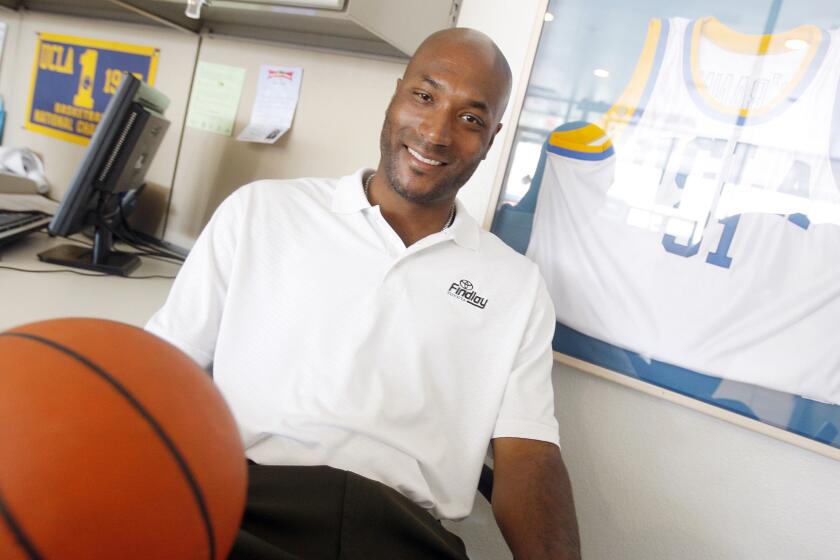Twenty-five years ago, ‘Little Hoop’ and Tyus Edney launched UCLA’s run to its last NCAA title
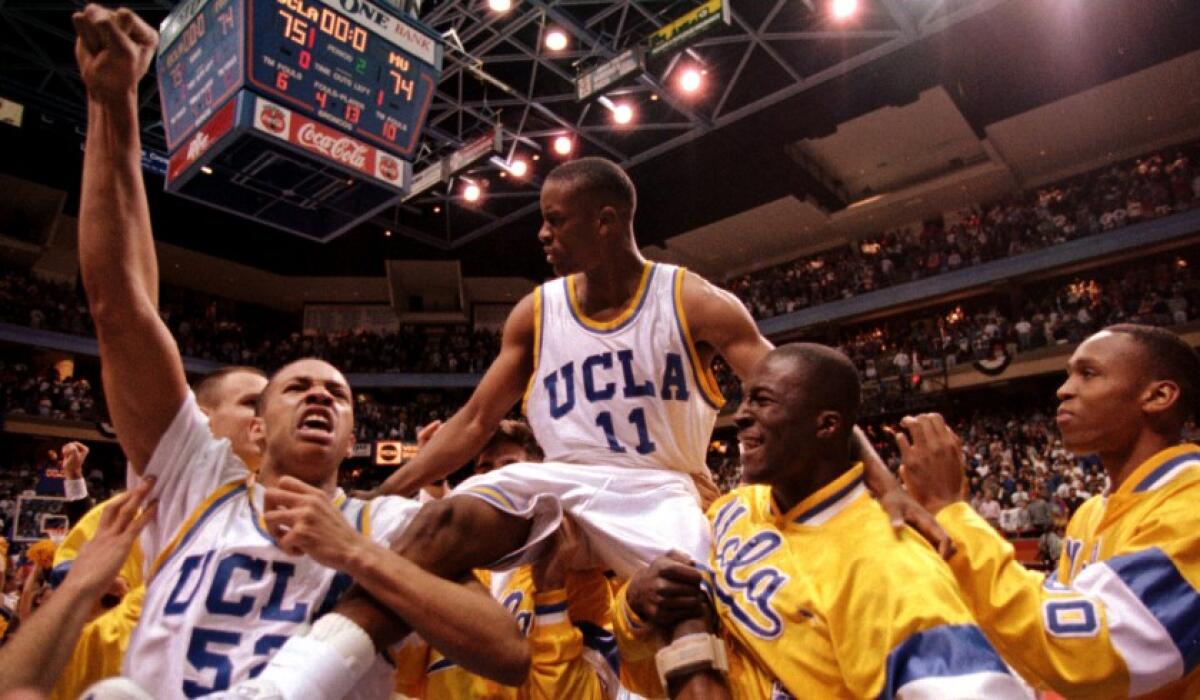
- Share via
Little Hoop was a pain.
Tyus and Russell Edney would lug the thing out of their Long Beach home every time they wanted to play basketball in the driveway, the young brothers hooking the wood backboard and metal rim to the gutter above their garage.
Little Hoop could be dangerous.
The basket occasionally fell, once plunking Tyus on the head and requiring several stitches. There was no telling how many busted lips and sprained ankles the boys sustained.
Little Hoop didn’t seem to enhance their game.
The basket stood just a touch over 6 feet off the ground. The rim wasn’t regulation size. The boys had to use a miniature ball.
Hank Edney used to come home from work and cringe whenever he saw his sons playing on the thing.
“You guys spend too much time on that Little Hoop,” Hank would say, using the nickname they had all given it. “It’s going to mess up your form and your shots and everything.”
If nothing else, everybody agreed that it forced the boys to get creative, especially little Tyus. He would drive toward the basket, confronted by the flailing arms of a brother two years older and just as many inches taller. Pump-fakes, scoops and hooks all became part of the arsenal of the jitterbug point guard who would go on to star for Long Beach Poly High and UCLA.
He had no choice.
“You had to come up with all these different little shots to get the shot off,” Tyus said, “and kind of one of my things that I learned how to do was shooting it around arms.”
It was here on this driveway basket, Tyus’ torso twisting, his body suspended in midair, his hand releasing the ball just inches above hostile fingertips, that the most iconic shot in UCLA basketball history was born, nurtured and perfected.

“I think I’ve seen that shot on that Little Hoop,” Russell Edney said of a basketball prayer that would be answered 25 years ago this weekend, “about 10 or 15 times.”
Kids often mimic their heroes making last-second shots, the scene having played out countless times in backyards, driveways and parks across the country. This was Tyus making his own play, years before he knew what it might become.
::
The game was over. The season was lost. The misery was enduring.
UCLA, winner of a record 10 national basketball championships, seemed cursed on that March 1995 day inside Boise State University Pavilion.
The top-seeded and heavily favored Bruins found themselves trailing by one point and down to their final, longshot chance during a second-round NCAA tournament game after Missouri’s Julian Winfield made a contested layup with 4.8 seconds left.
As the Tigers poured onto the court in celebration, a timeout halting play, the Bruins contemplated another premature finish amid a two-decade title drought that showed no sign of abating.
“When Missouri made that basket, five guys called timeout and they all riveted 10 eyes right through me.”
— Former UCLA coach Jim Harrick
“The prominent thought in my mind was, I can’t believe our season’s going to end like this,” said Bob Myers, then a Bruins benchwarmer who would go on to become a part-time starter and much later general manager of the Golden State Warriors. “We were the No. 1 overall seed, we had a wonderful year, we had great character, we had great leadership and coaching and I just felt like it was one of those moments in life where I was thinking, this isn’t right, this isn’t fair, this isn’t how it should be.”
Jim Harrick was familiar with that feeling.
The UCLA coach had made it past the regional semifinal round of the NCAA tournament only one time in 10 previous trips with the Bruins and Pepperdine. In 1983, when he coached the Waves, his team had lost a six-point lead with 57 seconds left in overtime during what became a gruesome double-overtime loss to eventual national champion North Carolina State.
Only a year before UCLA sought a miracle finish against Missouri, the Bruins, as a No. 5 seed, had fallen in the first round to No. 12 Tulsa.
All seemed lost again as Harrick’s players fixed their gaze on the coach while walking toward the timeout huddle.
“When Missouri made that basket,” remembered Harrick, now 81, “five guys called time out and they all riveted 10 eyes right through me.”
The coach had a plan. It would involve not his team’s best player but its smallest and its speediest, a 5-foot-10 point guard specially equipped to make this sort of play.
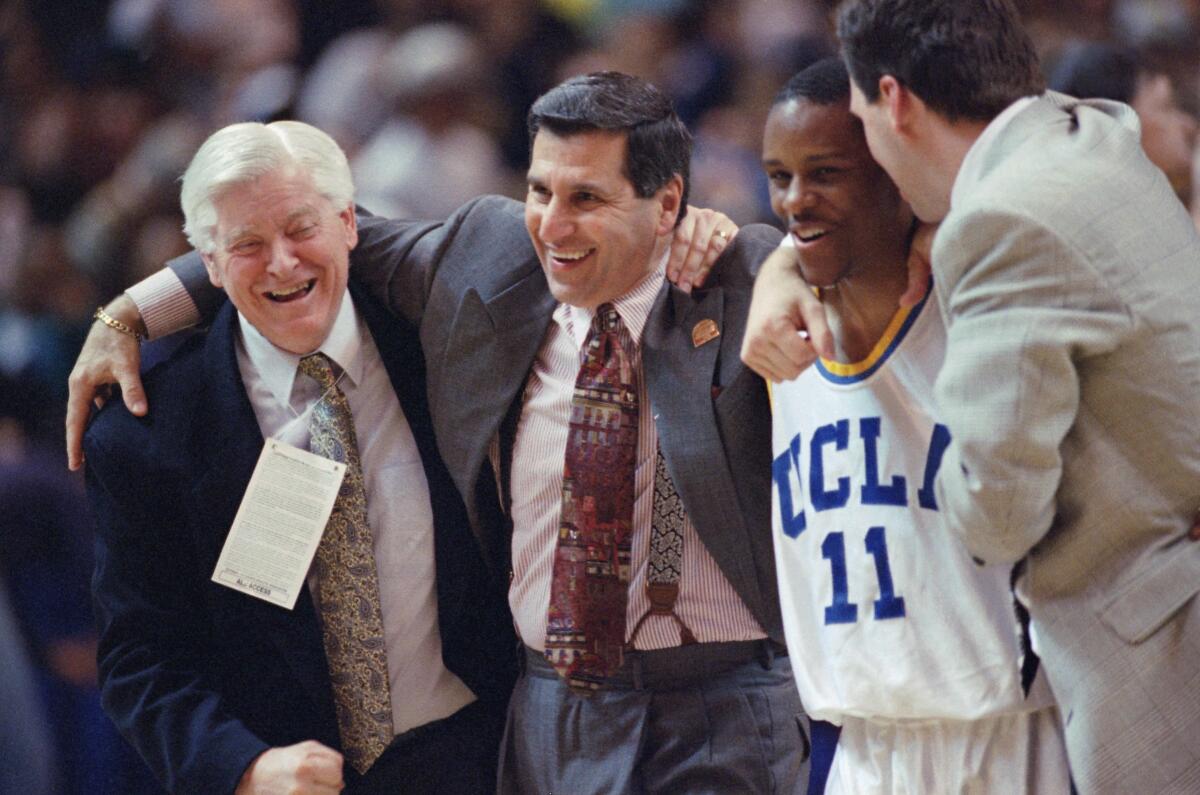
::
Edney had found himself in a similar spot just two years earlier, albeit completely unscripted.
He stole the ball at midcourt in the final seconds of a second-round West Regional game against Michigan, the score tied and UCLA needing a basket to win. Edney drove toward the rim, hoping for a layup, but found Juwan Howard, the Wolverines’ towering 6-9 forward, in his way.
Edney passed to teammate Ed O’Bannon, who was not expecting the ball. The pass was stolen, the Bruins went on to lose in overtime and Harrick would lament that he had wanted Edney to shoot.
Over the years, Harrick made his players practice frantic end-of-game situations, running a drill in which each of them dribbled the length of the court against a defender in six seconds or less. It usually didn’t go well, players either losing the ball out of bounds in their hurry or missing the shot.
“None of them could do it,” Harrick said, “except Edney.”
The coach made a high-pitched noise, indicating why the hard-charging dynamo was specially equipped to pull it off.
With Toby Bailey as a starter, UCLA went 13-0 and finished the 1994-95 season on a 19-game winning streak en route to capturing the NCAA title.
“Zoop-zoop-zoop, like a roadrunner,” Harrick said. “Zoop-zoop-zoop, zoop-zoop-zoop.”
Edney, the fleetest player on the team, had been doing this sort of thing since taking his talents from the home driveway to youth league games at Victoria Park gym in Carson.
It didn’t always result in heroic finishes.
“At Victoria Park, he used to dribble through everybody, he’d come down and look spectacular and then miss the shot,” said Hank Edney, who was his sons’ first coach. “I said, ‘Tyus, I don’t care how good you look coming up the court and how many people you go around. If you don’t make that basket, it doesn’t mean anything.’ ”
The degree of difficulty rarely matched what Tyus faced in his own driveway, where the rules for playing on Little Hoop were strictly enforced. Goaltending was closely monitored because the rim was shorter than some of the neighborhood kids who came over for two-on-two battles. Dunking was not allowed except on breakaway plays, for fear of the whole thing crashing down on a contested shot at the rim.
Said Tyus: “Every score was hard. You had to really get creative.”
Said Russell: “You couldn’t pretty much do a regular layup because the ball was small and there wasn’t a lot of space. In order to get the shot off, you would have to do like little circus shots and if you didn’t get it off correctly, you could get it blocked to your neighbor’s house.”
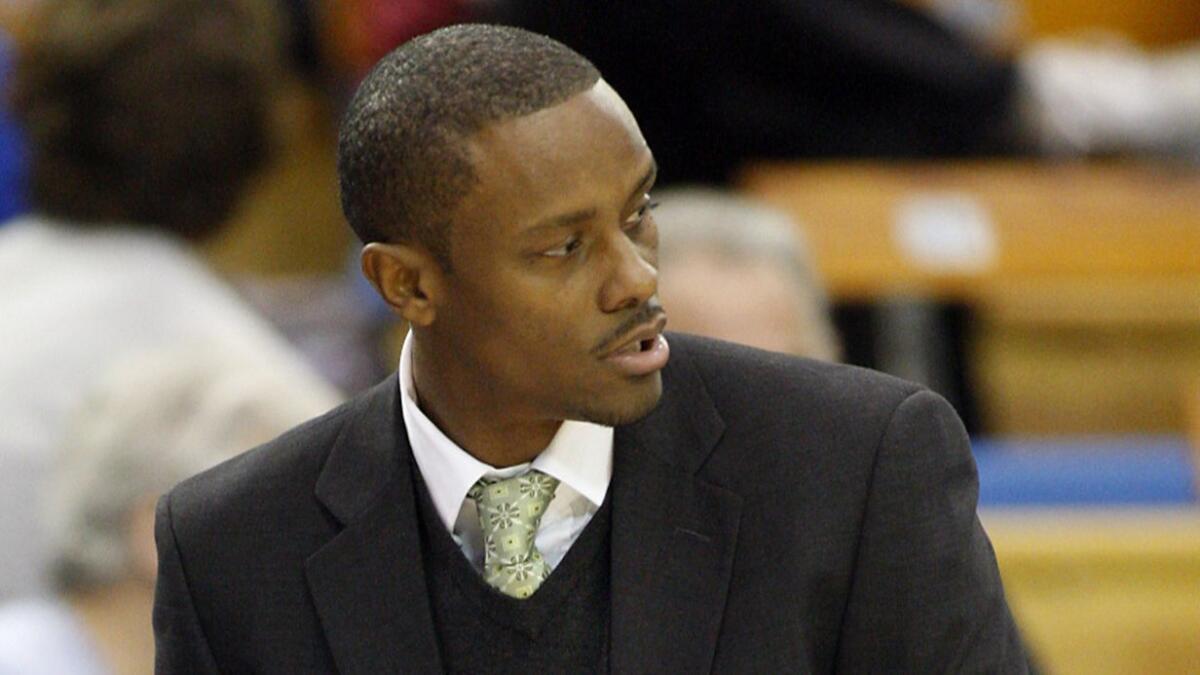
Some of the neighborhood kids preferred Little Hoop to the regulation basket on a court around the corner. Games stretched into the night, illuminated by a porch-light bulb. The Edney boys wouldn’t even let a motor home parked in the driveway stop them, hoisting shots from either side of it.
Hank’s cynicism toward his driveway basket softened during another game at the Victoria Park gym when he saw his son make an inventive move.
“I said, ‘I’ve seen that move before,’ ” Hank said. “That’s a move I saw on Little Hoop.’ ”
He would see it again.
::
As he gave orders in the timeout huddle, seeking a savior in those final seconds against Missouri, Harrick had a job for each player.
“I sat them down, and I said, ‘All right, you in the corner, you in the corner, you on the wing, you on the wing,’ ” Harrick recalled, ticking off the responsibilities of everyone except his point guard.
A look at the players and coaches from UCLA’s 1995 NCAA men’s basketball championship team and what they are up to today.
The onus would fall on Edney.
“I wanted one guy to take it down,” Harrick said, “and I told Tyus I wanted him to take it the length of the floor, they’re not going to foul you, take it to the rim and let’s see what happens.”
Coming out of the huddle, Harrick walked out onto the court, his arm draped around Edney. The coach repeated his request so that there would be no doubt.
“I kind of yelled at him,” Harrick said. “I said, ‘Tyus, do you have a crystal-clear understanding of what I said?’ ”
Replied Edney: “Yes, you want me to shoot the ball.”
It wasn’t the last order Edney would hear as the Bruins drifted out of their coach’s earshot.
“Give me the damn ball!” O’Bannon, the team’s top scorer and emotional leader who would become the consensus national player of the year, yelled at Edney. “I want the ball!”
Edney nodded softly at the conflicting agendas, unsure how it would all play out.
Fate seemed to be smiling on the Bruins even before Cameron Dollar’s inbounds pass from the baseline. Harrick scanned the court and noticed that Missouri counterpart Norm Stewart had not inserted either Sammy or Simeon Haley, the Tigers’ 7-foot, shot-blocking twins.
“By then it was almost a second-nature thing; it was like, oh, well, his arms are up, I’ll just shoot around him.”
— Tyus Edney
Edney knew the most important thing was not getting slowed on his way to the basket from the backcourt. If he encountered a trap, he would have to dribble through it.
He gathered the pass from Dollar in stride and took three dribbles before reaching midcourt while facing token pressure because Missouri did not want to foul him and put him on the free-throw line. Edney made a behind-the-back move as he zipped into the frontcourt, changing directions to elude the initial defense.
Three more dribbles followed as Edney reached the paint and more defenders converged upon him. As he neared the basket, Edney was confronted by the long arms of Derek Grimm, Missouri’s 6-9 forward.
All those crazy shots on Little Hoop had prepared Edney for the biggest moment of his basketball career.
“By then it was almost a second-nature thing; it was like, oh, well, his arms are up, I’ll just shoot around him,” Edney said with a chuckle. “Even though it was on a different scale, it was still an instinctual type of thing.”
Edney pushed off with his left leg, twisted his body around Grimm and released his four-foot shot just above the defender’s fingertips. The ball banked off the backboard, bouncing off the front of the rim before falling through the net as the buzzer sounded.
“YEEAAHHH!” the crowd exhaled as Edney’s teammates poured onto the floor to engulf him after the 75-74 win. Myers was the first to arrive, wrapping his arms around Edney and lifting him from behind as Edney raised his arms in triumph.
“He’s the hero,” Myers said, “and I’m just the guy that was happy that he had got us through that game and we could keep playing.”
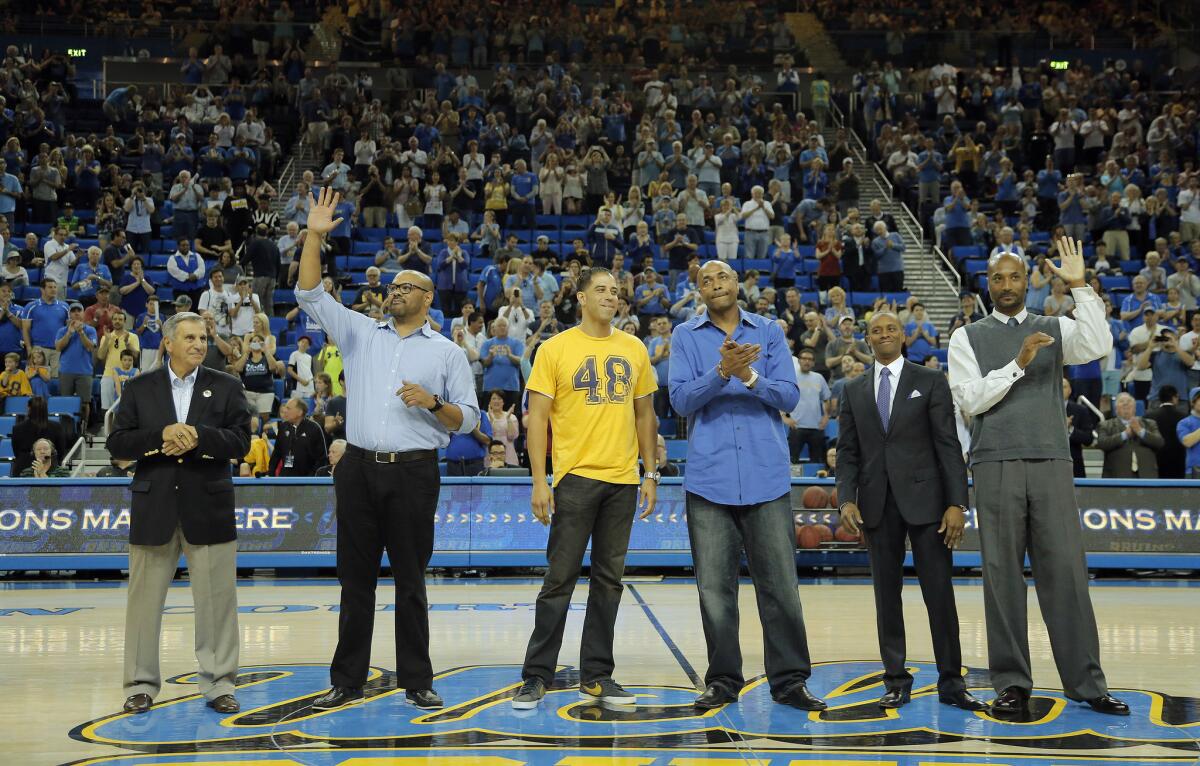
UCLA would not face another challenge like this on the way to hanging its 11th national championship banner, winning its last four games by an average of 12 points and every game by at least six. The Bruins would beat Arkansas by 11 in the title game in Seattle with Edney limited to just 2½ minutes because of a sprained wrist he sustained two days earlier.
His shot would live on for eternity, the defining moment of Harrick’s coaching career and a memory that continues to resonate for its creator a quarter of a century later. Edney was stuck in a crush of shoppers at the grocery store last week amid the novel coronavirus pandemic when he detected the steady gaze of the middle-aged man behind him in line.
“Hey, what’s your name, man?” the stranger finally asked.
“Tyus Edney.”
“I thought so, I thought so.”
It was a sequence that has played out numerous times over the years for Edney, now the director of engagement for UCLA’s athletic department. What comes next is equally predictable.
“They’re like, ‘Oh!’ ” Edney said, repeating the dialogue. “Four-point-eight! The shot!”
Yes, the shot. It seemed as if everybody had seen it before.
More to Read
Go beyond the scoreboard
Get the latest on L.A.'s teams in the daily Sports Report newsletter.
You may occasionally receive promotional content from the Los Angeles Times.


